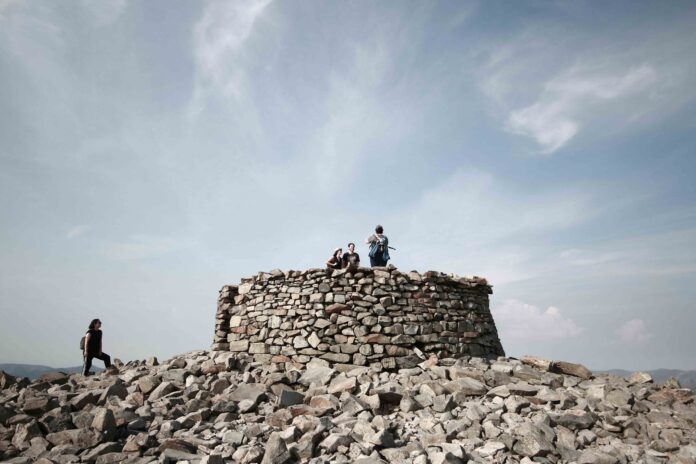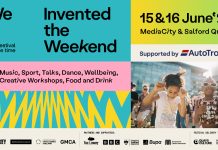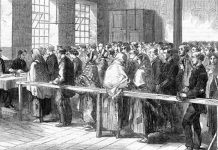From the highest inches of England, as Alfred Wainwright dubbed the summit of Scafell Pike, the landscape unfolds like a show lawn smashed up with a golf club. Whatever your temper these are kaleidoscope horizons: to the West, past the minarets of the Sellafield power station, the Irish Sea glitters like musket-flash in the mid-August sun; to the East, beyond the bustle of Windermere MiG choppers hang in the sky like dozing swamp flies; to the North, past the brazen teat of Great Gable, the heavens glare with the media slut-shaming of the Finnish prime minister on the world stage; while to the South, beyond the conurbations of Kendal and Broughton-In-Furness an MGM comedy cast of billionaires, Etonians and tech criminals conspire to saw off the South East corner of the landmass and kick the bit we’re on into the North Sea.
Up here, though, it’s mostly ourselves we spy, as we jostle for the space to take our selfies confirming conquest of the high ground.
“Fellwalking used to be an outdoor pursuit,” says Gillian Race, front-of-house manager at the Wasdale Head Inn, British climbing’s spiritual home, which nestles obdurately at the foot of the peak. “Now, it’s something people do for their mental health.” It’s since the pandemic, of 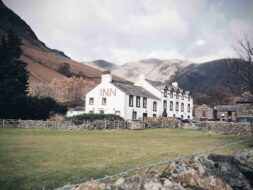 course, that the explosion in day-tripping has torn through the area, yet like so many catering establishments the inn is desperate for staff. “A friend of mine was in Bowness recently,” she confides. “She said it’s like Blackpool.”
course, that the explosion in day-tripping has torn through the area, yet like so many catering establishments the inn is desperate for staff. “A friend of mine was in Bowness recently,” she confides. “She said it’s like Blackpool.”
Give me green, give me grandeur, give me nothing man-made, the eye thirsts. Give me a world that survives to a vanishing point. So remote is the valley here the inn was without electricity until the 1970s, yet if you look out across Wastwater – it’s true wild-places, here, with not a single cafe or concession stand, nor barely any evidence of human intervention at all – the shores are dotted with camper vans, windbreakers, picnic blankets. This on a blowy weekday afternoon.
“It’s just this last month,” says Gillian, “that we’ve seen the drop off.” She nods toward the menu the inn struggles to fulfil in a location in which it commands a total monopoly. “Everything’s going up and they don’t want to pay the prices. But then who can blame them?”
Walking the walk
In the drear of a Spinningflields rain-shower Morag Rose’s pink hair lights up the day like a piece of good news. The academic, arch psycho-geographer and leader of the legendary Loiterers’ Resistance Movement – dedicated to uncovering the hidden secrets of the city – is one of the leaders of the campaign to save the public towpath at Ralli Quays. “I haven’t experienced such a level of public interest since the Library Walk campaign,” she tells me. “I’m getting stopped by people in the street. I think it’s the love of the river and the sense that it’s undervalued…that enough is enough with developers not caring about communities.”
Why is the Irwell so hidden in the first place? In Liverpool where Morag works, I remind her, the Mersey is a big deal. And the docks, of course. Isn’t it all those water features that gives that city its sense of romance? “Well, I prefer not take an essentialist view, there are a lot of complexities,” says Morag, and I realise I’m being gently slapped down. “But I do wonder if Manchester hiding its rivers and canals is part-and-parcel of concealing the more shameful sides of its history, in terms of worker exploitation.”
We’re supposed to be discussing the impending public inquiry…Morag is about to meet with councillors and the Mayor is about to write to residents hinting at an evolving official position… but when you meet up with Morag the pedestrian things can take flight. Assessing 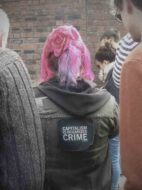 the comparative listening skills of Salford and Manchester’s planning committees opens up into a mini conference on the politics of walking: the recent Kinder Trespass commemorations (“good that it was forward-focused on Climate Emergency and not just looking back”); the latest with the Peterloo Memorial furore (“I think Deller’s preferred option is to have it closed all year round but accessible on the anniversary with a lift”); and her most recent thoughts on the Pusher story (“it fascinates me that it’s somehow easier to imagine this evil fantasy figure than to accept the facts.”)
the comparative listening skills of Salford and Manchester’s planning committees opens up into a mini conference on the politics of walking: the recent Kinder Trespass commemorations (“good that it was forward-focused on Climate Emergency and not just looking back”); the latest with the Peterloo Memorial furore (“I think Deller’s preferred option is to have it closed all year round but accessible on the anniversary with a lift”); and her most recent thoughts on the Pusher story (“it fascinates me that it’s somehow easier to imagine this evil fantasy figure than to accept the facts.”)
You find there were things you were meaning to ask her about and you wander off from there.
Once, on one of Morag’s famous LRM walks our task was to unlearn the city. We were paired off in twos and told to walk around inventing new histories for the places we passed. Though you ‘got it’ on the day you didn’t feel the little buzz until the next time you went by and your mind retrieved it as it would a happy memory.
Morag’s walks would be perfect down by the river, I think. “They’re always good there,” she says. “It’s the rivers and canals where all the deep stuff is, the monsters and folk tales. All the things that tell us about ourselves.”
Zine the light of day
In a hall thrumming with customers the sound of Heena Patel’s fretting gets lost in the hum. “We need brown paper bags! I forgot brown paper bags! Zines should be sold in brown paper bags!” To the co-founder of Over Here fest, a bring-and-buy dedicated to zine-makers and creatives of colour, the eleventh commandment is foolishly disregarded. Lack of carriers might be a minor detail, of course, but with zines it’s the small things that matter. “They’re about making and sharing.” she says. “And getting it out there.” The hand-stitched spine on a late-arriving chapbook imparts a love that can’t be delivered via Amazon.
“And fucking up.“ 
With the train strike in full swing there’s a worry numbers might be down on what they could be (“Of course we support the strike. We can’t not have the strike. It’s important!”) though teeming stalls in the PHM’s Engine Hall augur well for the day. There are zines about crisps and Keira Knightly and working in retail, and many about being a young woman of colour in the UK. “I write comedy,” Anna Lam tells me when I pick up one of her guides to survival ‘in a potato-eating world.’ “I should go in a bit harder, I think.”
For that clandestine-exchange-of-information vibe zines can’t really be beat. It trips the brain to scan these lists of lifestyle lifelines from BAME, gay, lesbian, trans and queer contributors (‘A List of Things That Bring Me Joy…’) Momentarily, you get that feeling you accessed a different algorithm, walked a different path in your head. Like when you saw the internet for the first time and thought to yourself ‘oh, this has potential…’. Then of course you calibrate. “What you hope for most of all is that people meet and share ideas and collaborate,” says Heena, as notes and coin are exchanged across trestle tables around us. “But you can’t force these things.”

@dannyxmoran

